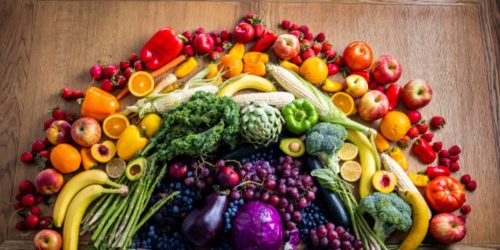
Our Heart Health Club nutritionist, Chloe Steele, talks us through the importance of eating a variety of real food to help keep our hearts healthy.
The leading risk factor for heart disease in Australia is poor diet 1. Whilst we may traditionally think that this is due to the link between obesity and heart disease, there is a growing understanding that food is more than just energy and the calories it supplies. What we need to understand is that what we eat is a set of instructions with the ability to control hormones, switch genes on and off, and influence numerous biological functions. By eating unhealthy foods with low quality ingredients, these biological systems become poorly programmed increasing the risk of heart disease or exacerbating its progression. This means that it is not just individuals who are overweight or obese that are at risk, it is everyone that has a bad diet.
With poor diet, comes the concept of poor-quality food. We have all heard the paradigm of eat less and exercise more. However, recent research has shown that in the last 20 years we have done just that and yet obesity and heart disease are still increasing2. This indicates that calories have not been made equally and that it is more important to focus on food quality and not calories, for example 100 calories of soft drink are not equal to 100 calories of kale. With kale, and all fruits and vegetables, come micronutrients, which can have a profound beneficial effect on the body, metabolism and ultimately your risk for heart disease.
It is important to remember that a healthy eating pattern can look different for everyone and ideally should be tailormade, however there are some general dietary principles that can be applied to individuals with heart disease or for those who would like to lower their risk of its development.
Control portion ratios and focus on real foods
Aim for a quarter of your plate for leafy greens and salads, a quarter for root vegetables and/or whole grains, a quarter of other veg like cauliflower, and the remaining quarter for lean protein such as fish and chicken or vegetarian alternatives like lentils, beans, and chickpeas. You should be aiming for 2 fruits and 5 vegetables per day of all different colours. Colours indicate different nutrient types, so eat a rainbow to get a broad spectrum of benefits. For example, blueberries provide a phytonutrient known as anthocyanin, which gives it the blue colour and can also be of benefit to inflammation, which is the underlying cause of heart disease 3. In contrast bright green spinach is a rich source of magnesium, which can help to reduce blood pressure 4.
Infographics reproduced with permission from the British Association for Nutrition and Lifestyle Management. Click to enlarge and read.
Eat regular meals and avoid snacking
When we eat, the carbohydrates in our food get broken down into sugar, which is one of the body’s sources of energy. In response, a hormone is produced known as insulin, which is responsible for ensuring that the sugar is taken from the blood and into the cells where it can be used. If we continually eat carbohydrates, insulin is produced at abnormal levels and can result in the cells no longer recognising it. This is known as insulin resistance and results in abnormally high blood sugar levels, which can ultimately develop into prediabetes or type 2 diabetes, both of which are risk factors for the development of heart disease. By avoiding snacking, insulin can return to normal levels between meals and ensures that the body has the best possible chance of recognising it.
Consider a Mediterranean style of eating
Although classed as a diet, the Mediterranean diet is more of a way of eating and has repeatedly been clinically shown to lower heart disease risk and prevent heart attacks and stroke5,6. It is a very flexible regime, which focuses on food quality and with only one thing prohibited, ultra-processed foods. It considers all the principles discussed above and is about portion balance and the quality of the food that is being eaten. It bases every meal on vegetables, fruits, whole grains, and a small amount of protein from beans, nuts, legumes, chicken, and fish. It also places a large emphasis on extra virgin olive oil, which if added to food after cooking can lower risk of heart disease 7. This way of eating also places an emphasis on mindfulness, taking your time and allowing the signals from your stomach that tell you that you are full, to reach your brain will ensure you do not eat too much.
References
- Welfare AI of H and. Australian Burden of Disease Study 2015: Interactive data on risk factor burden. https://www.aihw.gov.au/reports/burden-of-disease/interactive-data-risk-factor-burden/contents/dietary-risk-factors. Published 2015.
- Mozaffarian D. Perspective : Obesity — an unexplained epidemic. 2022:1445-1450.
- Mattioli R, Francioso A, Mosca L, Silva P. Anthocyanins: A Comprehensive Review of Their Chemical Properties and Health Effects on Cardiovascular and Neurodegenerative Diseases. Molecules. 2020;25(17). doi:10.3390/molecules25173809
- Afitska K, Clavel J, Kisters K, Vormann J, Werner T. Magnesium citrate supplementation decreased blood pressure and Hba1c in normomagnesemic subjects with metabolic syndrome: A 12-week, placebo-controlled, double-blinded pilot trial. Magnes Res. 2021;34(3):130-139. doi:10.1684/mrh.2021.0489
- Estruch R, Ros E, Salas-Salvadó J, et al. Primary Prevention of Cardiovascular Disease with a Mediterranean Diet Supplemented with Extra-Virgin Olive Oil or Nuts. N Engl J Med. 2018;378(25):e34. doi:10.1056/nejmoa1800389
- Wang DD, Toledo E, Hruby A, et al. Plasma Ceramides, Mediterranean Diet, and Incident Cardiovascular Disease in the PREDIMED Trial. Circulation. 2017;135(21):2028-2040. doi:10.1161/CIRCULATIONAHA.116.024261.Plasma
- Guasch-Ferré M, Hu FB, Martínez-González MA, et al. Olive oil intake and risk of cardiovascular disease and mortality in the PREDIMED Study. BMC Med. 2014;12(1):1-11. doi:10.1186/1741-7015-12-78


